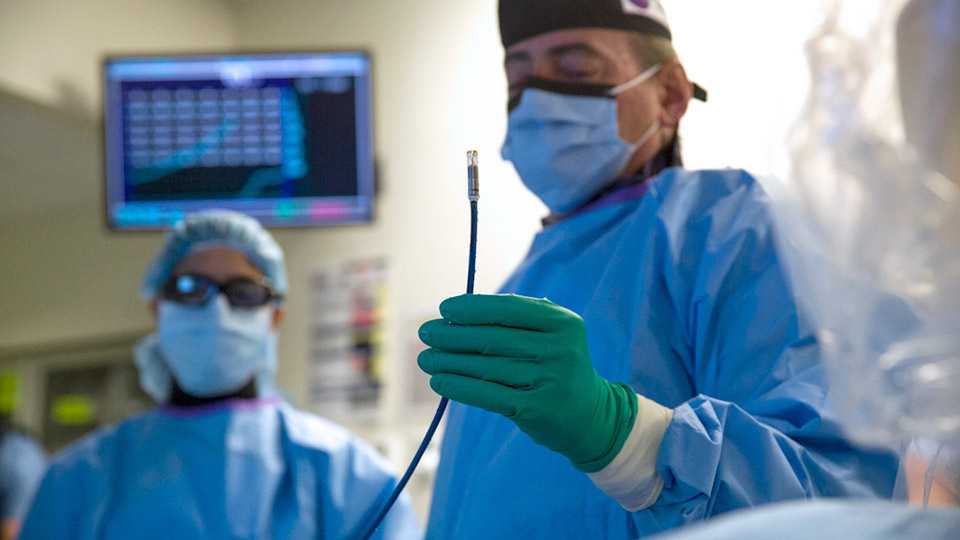Heart Rhythm Disorder Treatment
At NYU Langone’s Heart Rhythm Center, we use advanced technologies and new kinds of catheter techniques, including those developed from our own research, to eliminate chronic heart rhythm disorders deemed untreatable by other centers.

During your initial evaluation at the Heart Rhythm Center, our experienced team determines the impact of the arrhythmia, or abnormal heart rhythm, and whether treatment is needed. For some people with heart rhythm disorders, no treatment may be required. For others, medication and lifestyle changes can be effective. When necessary, catheter-based treatments or cardiac devices may be recommended.
Treatments for Heart Rhythm Conditions
We provide the following medical interventions to treat heart rhythm disorders.
Catheter Ablation
Catheter ablation is a minimally invasive way to eliminate a variety of arrhythmias. Doctors use a special catheter to deliver radiofrequency energy that can correct the abnormal heartbeat signals causing the arrhythmia without having to perform open heart surgery. For many people, this procedure cures an arrhythmia without requiring additional medication or surgery.
Pacemaker
A pacemaker is used to treat people who have a slow heart rate, known as bradycardia. NYU Langone is one of the sites for an international clinical trial evaluating the next generation of leadless pacemakers, which eliminate the wires that can be associated with infections and other complications. Dr. Larry Chinitz, director of the Heart Rhythm Center, is the national principal investigator for the trial.
Left Atrial Appendage Occlusion Device
The left atrial appendage occlusion device (LAAOD) reduces the risk of stroke in people with atrial fibrillation by stopping blood clots from traveling out of the heart and to the brain. This treatment, which includes the WATCHMAN™ device and others undergoing clinical development, are recommended for patients who are unable to tolerate anticoagulation therapy.
Implantable Cardioverter Defibrillator
An implantable cardioverter defibrillator (ICD) sends an electric shock to convert serious ventricular arrhythmias, such as tachycardia and fibrillation, back to a normal, slower, and regular heartbeat. ICDs significantly reduce the risk of death in people with these types of ventricular arrhythmias. These devices are now available in models that are transvenous, or inserted through a vein, and subcutaneous, or placed under the skin.
Medication and Lifestyle Management
For some people, medication and lifestyle changes can reduce symptoms and improve quality of life. You may be prescribed medications that lower blood pressure and reduce your risk of blood clots. We recommend a heart-healthy diet and regular exercise for all of our patients. We also have an active screening process to identify patients with obstructive sleep apnea, a cardiac risk factor.
Follow-Up Care for Heart Rhythm Conditions
For patients who receive a pacemaker or defibrillator, our device and arrhythmia monitoring center is staffed by clinicians who coordinate care between outpatient management and hospital-based procedures. Our team is available 24 hours a day, 7 days a week.
In rare cases, the leads that deliver electrical energy from a pacemaker or ICD to the heart need to be removed. The Heart Rhythm Center is a leader in lead extraction and management, and one of only four centers in the United States that perform extractions.